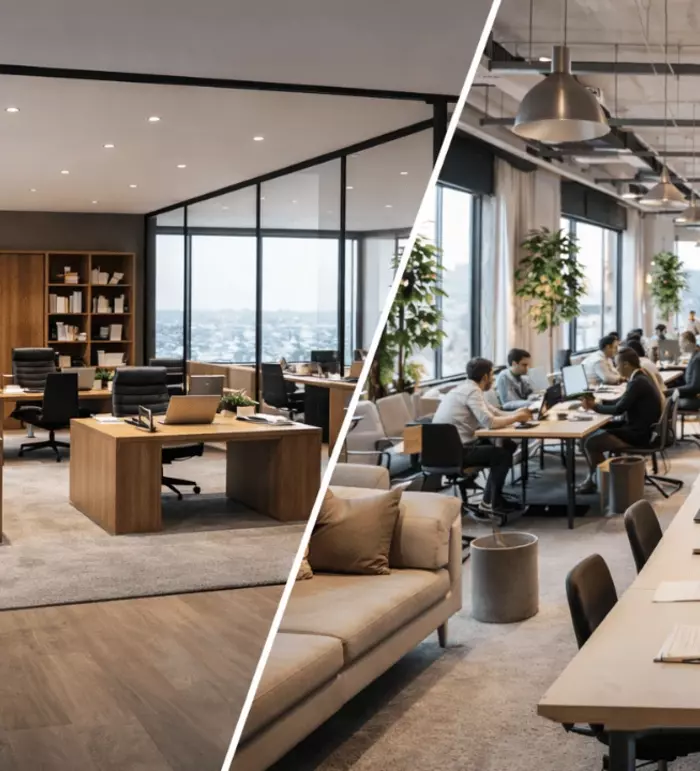Artificial intelligence is no longer a lab toy. It is changing how workspaces run, from how you book a room to how a building trims energy at 3 a.m. For fast-moving companies, AI in serviced offices brings the best of both worlds: flexible space plus smart services that grow with you. If you want the full package without owning the wiring, this is for you.
Serviced offices already remove the setup grind, then AI adds a layer of brains on top. Think occupancy data that right-sizes your floor plan, or maintenance that fixes itself before it breaks. If you are comparing options, start by understanding what is included on a serviced office space plan and which parts of the stack are enabled today.
This article reflects Flexioffices’ focus on people first service, problem solving and going above and beyond, which are central to how we recommend space and tech to clients.
Key takeaways
- AI in serviced offices cuts wasted space and spend.
- The biggest wins come from energy, safety and service.
- Start small with clear KPIs and expand what works.
- Governance matters: follow ICO guidance and NCSC tips.
- Choose partners who expose data and support upgrades.
What we mean by AI in serviced offices
When we say AI here, we mean software that learns from building and workplace data to make better decisions, often in real time. This can sit inside booking tools, sensors, access control, energy systems and service desks. It is different from yesterday’s “smart” gadgets because it adapts as your patterns change, not just when a rule is triggered.
Why now? Cheaper sensors, cloud tools and new AI models have lowered the cost. Major real estate firms are investing, and landlords are opening up APIs so operators and tenants can plug in their own tools. If you are weighing managed office space, ask what data and controls you get on day one, since that decides how fast you can pilot and scale AI.
For London teams, choice is wide and fast. The right building can give you AI-ready services and a flexible term, so you can trial without a long lease. Explore options across the capital on London office space.
The business case: cost, productivity, safety
The business case lands in three areas. First, cost: AI helps you match space to actual use. Occupancy analytics highlight floors you can release, or swap for a smaller footprint. That means lower rent, cleaner service bills and fewer empty desks. Second, productivity: research links indoor quality and smarter controls to better decision making and fewer headaches. One series of studies by Harvard’s Healthy Buildings team found cognitive scores improved when people worked in green, well-ventilated conditions, which supports investment in smarter ventilation and monitoring powered by AI controls.
Third, safety: AI speeds incident detection and response, from a water leak to a tailgating alert. Adoption is rising across corporate real estate. JLL’s 2024 Future of Work Survey reports that 90.1% of companies expect to run workplace and real estate processes with AI support over the next five years, which shows this shift is well underway.
Ignoring the topic brings risk. Poorly governed biometrics, for example, can breach data laws. In February 2024, the ICO ordered Serco Leisure to stop using facial recognition and fingerprint scanning to monitor staff attendance, which underlines the need for lawful basis, choice and alternatives.
Core AI use cases today
Before any list, it helps to picture a typical day. People arrive with mobile passes, the building trims fresh air as the weather swings, your team books rooms that actually exist, and facilities teams get a prompt before a lift fails. Under the surface, data flows from sensors and systems into models that learn what normal looks like, then flag what is not.
Occupancy & space optimisation
AI reads signals from access control, Wi-Fi and desk sensors to find true peak and average use. You can then resize your office, flip dead zones into collaboration space, or share floors between teams. The same data informs cleaning and catering so services match demand, not a fixed schedule.
Energy & sustainability
Energy is the largest controllable cost in many offices. AI-assisted building management systems adjust heating, cooling and ventilation based on weather, occupancy and indoor air quality. Over time, models learn the best settings per zone. This helps you cut bills and support net-zero plans that align with UKGBC’s energy performance targets for offices.
Workplace experience & concierge
Chatbots and copilots simplify room booking, guest registration and IT requests. Natural language prompts turn into actions, for example “book a 10-person room with Teams at 2pm in Liverpool Street.” Insights from these systems feed service improvements. For a feel of the local stock and amenities, you can shortlist from areas like Liverpool Street offices.
Safety, security & compliance
Modern access systems use AI to spot unusual patterns, such as repeated failed entries or tailgating. Visitor tools can screen guests against watchlists chosen by the tenant. If biometrics are used, they must be optional with a clear alternative like cards or fobs, and processing must meet UK data protection standards. See the regulator’s guidance on AI and data protection to shape your policy.
Predictive maintenance & FM
Facilities teams gain from models that flag abnormal energy use, vibration or temperature. These hints often appear hours or days before failure. Combined with digital twins, AI can suggest the lowest-cost fix and the best time to act. The big FM players are now shipping tools in this space, which makes it easier to adopt inside serviced or managed offices.
Risks, ethics & governance
Good governance makes AI safer and more useful. In the UK, follow the Information Commissioner’s Office guidance on fairness, transparency, purpose and data minimisation. Keep staff informed, run a Data Protection Impact Assessment where needed, and limit data to what is necessary.
Security matters too. Treat AI like software that must be secure by design. The UK National Cyber Security Centre, with international partners, has issued clear guidelines for secure AI system development. Use them to set supplier requirements, from threat modelling to supply-chain controls.
For biometrics at work, offer a genuine choice and record consent where appropriate. The recent enforcement action on staff facial recognition shows why proportionality and alternatives are essential.
How to get started in a serviced office with AI
Start simple. Choose one to two use cases that solve a real pain point, for example underused space or high energy bills. Ask your operator and landlord which systems are already in place and which data streams you can access. If you want a private fit-out with deeper control, look at a managed solution that your team can customise. See how that works in our guide to serviced, managed and leased offices.
A practical first path looks like this:
- Form a small working group, include HR, IT, Ops and Finance.
- Define two measurable goals, for example cut energy 10% or reduce no-show meetings 30%.
- Pick vendors that support open APIs and exportable data.
- Pilot on one floor for six weeks with a clear test plan.
- Share results with staff, then scale what works.
- Update policies and training as you go, not after.
If you prefer a ready-to-run package, a serviced office with built-in sensors and booking tools can be live in days. Use our serviced office space pages to shortlist based on location, size and amenities.
Measuring success: KPIs and quick wins
Decide what success means early. For cost, track total space per person, average peak occupancy and monthly energy per m². For productivity, watch booking friction, no-show rates and time to resolve tickets. For safety, record incident detection times and false positives.
Quick wins often show within one quarter. Right-sizing a floor or switching to demand-led cleaning is fast. Air quality tuning can cut headaches and raise satisfaction. There is growing evidence that better ventilation and lower CO₂ supports clearer thinking, which makes this a smart early move that staff feel straight away.
Future trends to watch, 2025–2027
Agentic workplace assistants will book rooms, move meetings and log tickets on your behalf, based on your calendar and preferences. Interoperability across landlord, operator and tenant systems will improve, which means fewer silos and better results from your data. Net-zero rules and climate adaptation will keep pushing AI to trim energy without harming comfort, in line with the UKGBC framework.
Choosing the right serviced or managed office partner
Choose partners who make AI easy rather than locked away. Look for transparent data policies, open APIs and a roadmap you can see. Ask for case studies, not just feature lists. Find out who supports your pilots and what happens if you want to bring your own tools.
Flexioffices can help you match your AI goals to buildings and operators across the UK. We cover the full range, from ready-made serviced suites to private managed floors that you can brand and equip as you like. If London is your target, start with our London office space hub, or compare serviced vs managed options using our short explainer on the differences.
Conclusion
AI in serviced offices is a practical way to cut waste, improve comfort and keep people safe. Start small, measure what matters and grow the wins. If you want a shortlist that fits your plan, our advisors can help you pick buildings and operators that are AI-ready. Speak to the team via Contact Flexioffices.
FAQs
How does AI support sustainability goals?
AI helps buildings learn optimal settings for heating, cooling and ventilation, then adjust in real time. That supports recognised frameworks for net-zero performance in offices.
What is the fastest AI win in a serviced office?
Most teams start with occupancy analytics and smarter room booking. These cost less than a full BMS upgrade and show quick results on space use and meeting no-shows.
Do I need to sign a long lease to use AI features?
No. Many AI-enabled features come as part of serviced offices or flexible managed terms, so you can pilot and scale without a long commitment. See managed office space for what is included.
Is AI in the workplace compliant with UK data laws?
Yes, if you follow UK GDPR principles. Be clear with staff, minimise data and test for fairness. Use the ICO’s practical guidance on AI and data protection as your reference for policies and DPIAs.
















